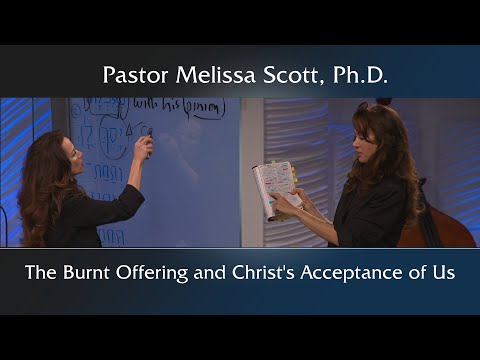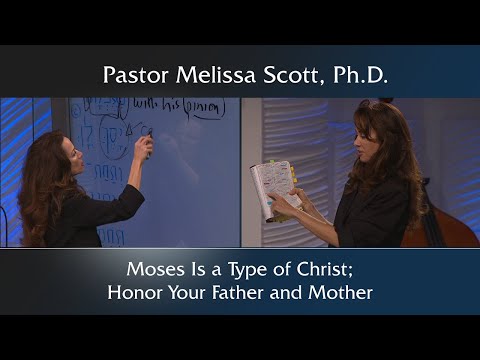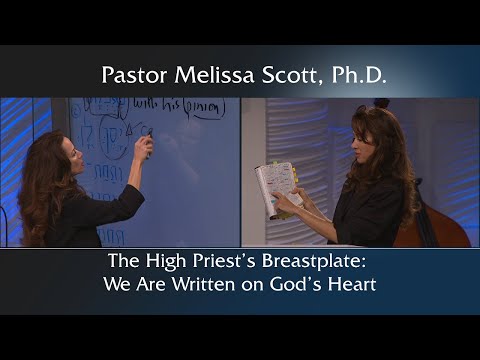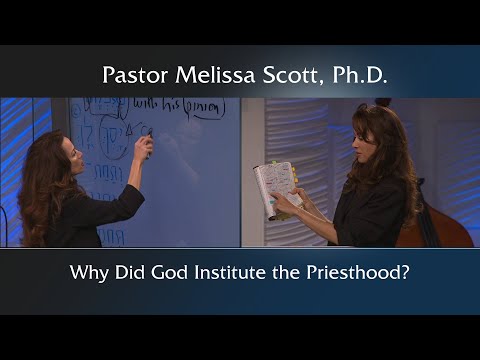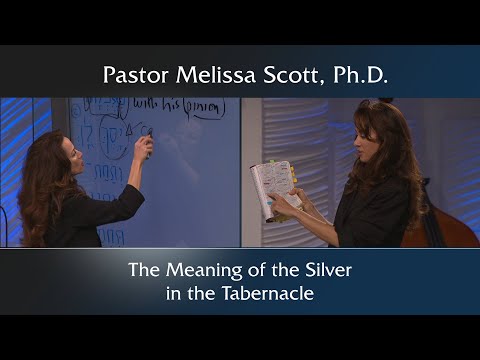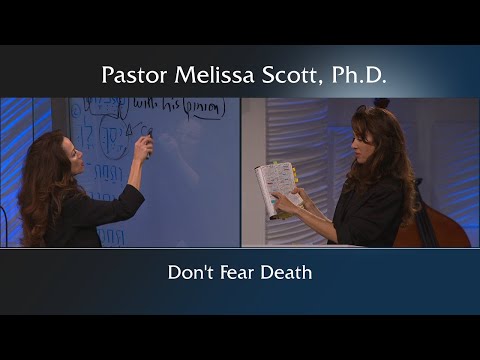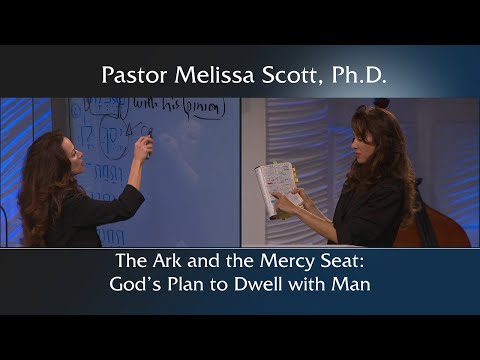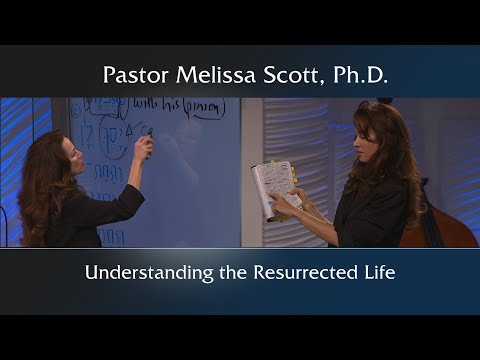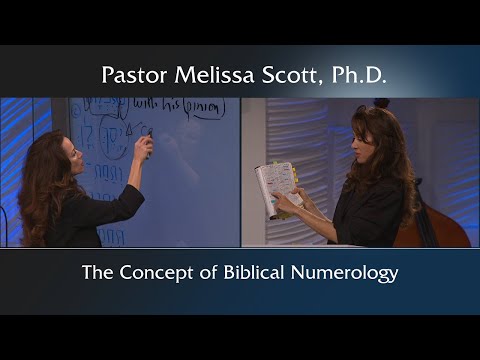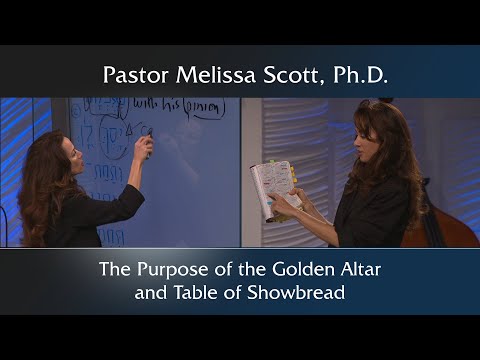The Burnt Offering and Christ’s Acceptance of Us – The Tabernacle through the Eyes of Christ #12
You have a lot of people who erroneously make this statement, “I accepted Christ.” Hmm? Haven't you heard that? I have said many times, you didn't accept Him. You may think you've accepted Him, but He accepted you when He went to the cross and died for you, and you were not yet, but your name was spoken before the foundations of the earth. He accepted you. You have a choice to accept or reject, this is true, but He accepted you. The offering, first and foremost represents Christ's acceptance of us. ♪ ♪ We have been looking at shadows and types in the tabernacle that point to the work and ministry of our Lord and Savior, Jesus Christ. We saw how God delivered a people out of Egypt's bondage, gave them instructions while they were in Egypt when they came out and continuously along the way. But I'd ask you to take notice of something.
Big difference between the instructions given to the individuals living in Egypt where God basically said to the; for the household to apply the blood on the doorpost and the lintels and then in doing so when the avenging angel or the death angel saw the blood, it would pass over. Big difference between that, which was basically something done for the entire body of people, family or servants living under the roof versus the children of Israel being brought out, out of Egypt and learning how to have fellowship and communion with God in a place of worship.
And so, the first one is pure deliverance, just straight deliverance, there's no strings attached except for applying the blood, nothing else. But the second, leading them out, a lifestyle of devotion and worship. Now we, that's kind of like a bird's eye view of looking at the story in two parts. But think of it this way, this is kind of where the modern church has derailed.
The modern church focuses on the outreach of delivering people, right? “Gotta get people saved, gotta go out and witness to them,” right? All that stuff. But fail to do the second part, which just like God did, there's the pattern right there. People are delivered out of Egypt's bondage. They probably knew that they were slaves under harsh labor but didn't know what it all entailed. Now they get out and they're delivered and they must learn to worship, to practice God's ways. Well, that's the church's problem. We're seemingly experts at going out and trying to “seek and save the lost,” even though that's God's job.
But not so expert in educating, showing people, teaching them that second part, the relationship part. It's not enough to say, let's go and preach the word. It's teaching people how to make the application, how to have the relationship, just like the children of Israel. And that started with God laying out first and foremost what He would prescribe for the children of Israel. And then eventually this would be a, we'll call it a universal application, the Ten Commandments, for example. And then after that there's a whole litany of things that God prescribes. The book of Leviticus starts the laws of offerings, which we're going to be looking at. And this is why it's crucially important not just to look at the tabernacle and how everything in the tabernacle functions, how it relates to Christ, but also understanding the offerings, because if the offerings are properly understood, again it gives a fuller perspective. You know, I can tell you about the altar, the brazen altar, and what would be offered on the altar.
But failure to tell you about what and how and why kind of leaves you with the mechanics without the, the heart or the guts. So that's what we're going to look at. And here the laws of offering kind of come with three parts to them: the offering, the offeror, and the priest. And I will show you how many times in each case of these three things I just said, Christ is in there somewhere in some capacity or fulfilling all of them: offering, offeror, and priest. The book of Hebrews says something regarding Christ, “A body hast thou prepared me as an offering,” His offering, the ultimate offering. So in the context of that, that He might obviously offer Himself up to reconcile us to God. And this is where it gets a little weird because we know without it being specified, it's not spelled out in black and white terms, but just think about it. Only the high priest, for example, could take the blood into the holy of holies and sprinkle the blood there; only the high priest alone.
So when, twenty years ago when I wrote that, what I called it “a little diddly,” Lamb of God, it didn't have necessarily a theological wondrous background. But in that song that I penned, I said that Jesus took His blood to heaven to cleanse an angel's band. Now the principle there may be a little bit caricatured, but the idea is there. Just like the priest only, the high priest alone being able to bring the blood and sprinkle it in the holy of holies, only Christ could bring His blood. And if you think about it, the people who passed away in the Old Testament sense, when it says He went and He ministered, they were awaiting the promise but died before it. That's what the book of Hebrews talks about.
So at some point in some theological way, He had to have taken either by Himself or by the act of Him laying down His life that His blood did cleanse those who were, who were already passed and those who were still considered unclean, not yet washed in the blood. So there's kind of all these interesting things. I didn't, by the way, I didn't have that great theological mindset, but it made sense to me when I was putting the words down, which I know now, looking back, I was just the hand in the pen for God to say, “Okay, write this down”" And I, I'm saying that because I cannot take credit for something that just, it flowed out of me, not of my imagination, but obviously of God kind of directing.
And that is the same mindset in the offerings. Now we see Christ as innocent, without spot or blemish, a sweet savor to God, while He carries the sin that was laid upon Him, bearing it, dying for it. So the offerings laid out in Leviticus, you've got the burnt offering, the meat offering, the peace offering, sin, and then trespass. And there are a few oddities along the way, but when God laid this out, it's very interesting that He started with the burnt offering, and obviously ends with sin and trespass. That's how God started. When we come to God, we can't even; we can't even understand what the burnt offering is. I'll explain in a minute. We come, when we're ready to approach God, we come by way of the sin and trespass, like guilty conscience, “How do I make this right? How do I fix the problem?” Not “How do I worship?” or “How do I submit?” So we do things in the reverse. God sets it up that way, just like I showed you with the tabernacle.
You've got to come through the door, and what was obviously should have been first in the instructions for us would have been build the structure, make the door, but God started first with Ark of the Covenant where His presence would be. So it's always, if you read the Bible properly, God is usually starting with Himself or His ways or His thoughts and then gets to us.
So it's important to study it in that way as well. So before I get to discussing the burnt offering, and if you want to turn your Bibles to the book of Leviticus, the word “offering,” first of all, if we look at the etymological side of the word offering from Old English, “the presenting of something to the deity.” If you look this up in an etymological dictionary, offering, the word “offering” is right beside it. It says, “the presenting of something to the deity; a thing presented,” from the verb offre, “to present in worship,” from ob, the prefix o, b, which is “in the direction of or to,” and ferre, not “fairy,” but ferre, “to bring or to carry,” from the root b, h, e, r, “to carry or bear children.” Actually that word, b, e; b, h, e, r, “to carry or bear children,” brought about the word bern in, I believe in Scottish or in Irish.
I just, that just came to my mind as I'm looking at this, “to bring forth a child or a baby.” The idea expressed in the Hebrew when we get to a concept of “offering” is the word qorbân, a “presentation” or a “gift.” The word that we're going to encounter over and over again, qorbân, has several different tentacles to it, but attached to it is for the burnt offering, the word, the Hebrew word 'ôlâh, “to ascend.” The Septuagint renders 'ôlâh, which is being rendered “burnt offering.” The Septuagint renders it olakautoma, where we actually get our word for “holocaust: to ascend up,” all right? So these qorbân would be brought to God's dwelling place, the tabernacle either delivered to the door, at the door, not entering in, but at the door, or in the court to become appropriated or consumed by and in the service to God.
Three classes of qorbânim, and I put the -im at the end because that makes it plural. One, of dedication for the sanctuary of God, better called the “gifts of dedication.” Two, for the maintenance of the servants of God, which would include firstfruits, tithes, and firstborn. Three, for God Himself, or what is referred to as the “altar sacrifices,” where everything presented is completely consumed to or used for God, and this last class, some of these are even called “most holy offerings.” So there's kind of this class inside, and then there's going to be a breakdown of different classes inside the burnt offering. The law of burnt offering, or 'ôlâh qorbân, defined as wholly consumed to God upward, and in contrast to other offerings, was a sweet saver offered for acceptance. And I'm going to have to explain this by reading the text to show you what I'm talking about.
So we'll read the text in a minute. So in this way, the burnt offering is different than the sin offering. It was also, the burnt offering required a life, so it's different than the meat offering. And then, of course, there are offerings. For example, the burnt offering was a sweet saver offering, as I just said, like the meat or peace offerings belonging to a class offered on the brazen altar, where here, we are not talking, for the burnt offering, sin is not the theme. And there is an extreme amount of confusion. If you read commentaries, there are a lot of people confused about this. The burnt offering is not an offering for sin, and I'll explain why in a minute. The sin and trespass offerings were consumed not on the altar, but usually on the ground, right outside the door. And there there's a big difference there. And we'll detail these as we go through them one by one, because I think there's a lot of homogenized ideas that just, we just kind of mix it together and “Oh, it's offerings,” right? Some of these would be portions designated for the priest to eat, for example, but in some cases, the blood would have to be taken, and that blood would be taken by the priest and sprinkled.
Now, in the burnt offering, Jesus is the fulfillment in that He wholly and completely offered Himself for us. But as I said, not as the sin or trespass offering, that comes later, but as completely accepted and pleasing to God. So some of the characteristics of this offering: perfect, voluntary; when I say “vicarious,” be careful, it's not vicarious as in a substitution. I'll explain. Slain by the offeror, blood sprinkled, and wholly consumed, except for usually the skin that sometimes would be held back. And there are, it seems like God wasted nothing here. Now, In Leviticus, we are given the instructions, the how, but we're actually not told why. Think about that for a minute. Okay? Why sin and trespass, that makes sense, right? That's obvious, I hope. Yeah? Okay. But this offering, it doesn't give a why.
It doesn't say why. Now, if you read carefully, and I'm going to read this right now, and I'll probably reread it again because we have to go to Genesis in a minute, so because I asked you to turn to Leviticus, I'm going to read Leviticus. “And the LORD called unto Moses, and spake unto him out of the tabernacle of the congregation, saying, Speak unto the children of Israel, and say unto them, If any man of you bring an offering unto the LORD, you shall bring your offering of cattle, even of herd, and of flock.” And I want you to notice something.
Unlike the prescribed requirement in Egypt to apply the blood, which was considered a corporate application for your family, here this particular offering becomes singular. “Let him, let him, let him offer a male without blemish: he shall offer it of his own voluntary will at the door of the tabernacle of the congregation before the LORD. And he shall put his hand upon the head of the burnt offering, and it shall be accepted for him.” Now, I want you to focus in on that “it shall be accepted for him.” And the rest of that sense is to make an atonement for him, but do not be confused that “atonement,” the word, the Hebrew word there, Strong's 3722 is kapporeth, but do not make the mistake of thinking that this instruction as you're reading it in English means atonement the same way as sin and trespass, and I'll explain why in a minute.
So just kind of note to self, keep that there, but the more important words is, “it shall be accepted for him.” Okay, now, why am I saying this to you? Because burnt offerings occur, the first place we find them is in Genesis 8. So after God tells Noah to build the ark and tells him that He's going to basically flood the earth. So after the waters abate, Noah emerges. And it's very interesting because it's not as though God said, “Noah, I want you to follow these instructions. Noah, I prescribe or I mandate.” Listen carefully, I'll read it to you. You don't have to turn there if you don't want to, but it says, “Noah went forth,” that would be Genesis 8:18.
I'll read it to you, “Noah went forth, and his sons, and his wife, and his sons' wives with him: every beast, every creeping thing, every fowl, whatsoever creepeth upon the earth, and after their kinds went forth out of the ark. And Noah builded an altar unto the LORD.” I don't read anywhere where God's voice is recorded saying, “Noah build Me an altar so you can sacrifice.” It doesn't say that. So whether God spoke to him or whether this was what we would carry out in the New Testament mindset of an act of God's Spirit leading, but it says, Noah took, “Noah builded an altar unto the LORD; took of every clean beast, of every clean fowl, and offered burnt offerings on the altar.” Now take a look at something because I, those of you who read Hebrew that I've taught, I highlighted this in my Hebrew Bible so you can see here. So he sacrificed, and you can even see in the word sacrifice, ve-yal, “and he sacrificed,” and here we have 'ôlâh, “burnt offerings.” So it's right there. You can't miss it just in case somebody says, “Well, the English isn't translated properly.” It's there.
So here, this one is unsolicited. God didn't say, “Do this.” We don't have a record. Maybe God did, but we don't have a record of that. We only have a record of Noah coming out of the ark with his wife and his children, and offering of “every clean beast, every clean fowl, offering burnt offerings on the altar. And the LORD smelled a sweet savour; and the LORD said in his heart, I will not again curse the ground any more for man's sake; for the imagination of man's heart is evil from his youth; neither will I again smite, any more, every thing living as I have done.” Now, what's interesting here, and I want you to think about this, the burnt offering here cannot be an offering for sin. It cannot. Why? First of all, there was no law yet, so the definition as we understand it had not yet been given. No, we saw the act, for example, of brother against brother, Cain and Abel, killing his brother. But again, there was no law yet given that said, “Thou shall not kill.” So all we have are acts of individuals, which for certain we know there had to be some type of a moral compass, because even in the act of brother killing brother, we have a reaction.
We have a conversation between the individual and God. But here, something very unique, which is God has already smote the earth with water. So if there was an idea that man was evil, that verse I just read 21 says, “I will not again curse the ground any more for man's sake; for the imagination of man's heart is evil from his youth.” That expression has to encapsulate the mindset that God knew evil had not been eradicated. Why? Because we're going to see it in the offspring of Noah, and we're also going to see it in Noah himself, so the idea here has more to do if you listen to God's words, He says, “I will not again curse the ground any more.” There's almost a covenant concept behind the burnt offering. I'm not saying it is covenantal in its entirety, but there's this, “I will not again,” almost like an a promise or an oath from God, and then, the last part of that chapter says, “While the earth remaineth, seedtime and harvest, and cold, heat, summer, winter, and day and night shall not cease.” So, and then it goes on to God will then give a covenant of the rainbow.
But it cannot be a sacrifice that Noah made for sin, and I'm going to explain to you why. And the best way to show this to you is to have you turn to Genesis 22, because when you see the background of the burnt offering, it makes a lot of sense. Otherwise, how can we properly understand this offering if we just simply read the text I read to you that says, “Accepted and shall essentially be an atonement for him,” and it's automatically assumed that if this is wholly consumed to God, something wholly offered to God, that somehow because the word “atonement” appears, it has to be in balance with sin, but it is not. So, let me show you again. Genesis 22, “It came to pass after these things,” you know the story really well. God speaks to; He tempts Abraham and says unto him, basically, “Take your son, your only begotten son, son of promise, not the son of flesh,” so Isaac, “go into the land of Moriah; and offer him there for a burnt offering upon the mountains of which I will tell thee of.” So, just so you can see it with your own eyes.
If you can recognize the ayin, lamed, chet, those are your words for 'ôlâh, “burnt offerings.” So, God says, “Take your only begotten son and offer him as a burnt offering, wholly consumed up to God,” right? And you know the rest of the story. The rest of the story basically is they're going up the mount. They tell, or Abraham tells, the servants, “Wait here, we'll be back.” They go up the mount. Everything's all ready, and then, of course, when God saw what was in Abraham's heart, that he would have carried out the act of sacrificing the son of promise, Isaac, the angel basically calls to him, his hand is stayed. He turns around, there's a ram caught in the thicket, and God provided another offering in place of Isaac.
Now, again, this could not have been a sin offering. So, you have a problem if you're going to read the opening passages of Leviticus and read “accepted” and “atonement for,” and I'm going to show you why when you look at the sin offering. There you have something coupled. You may have a burnt offering coupled with a sin offering because there are, there are different dimensions of the offerings, but the burnt offering itself can only be again once more; watch what happens, as he, “Abraham lifted his eyes, looked and behold him, there was a ram caught in the thicket,” that's verse 13 of the twenty-second chapter, “Abraham went and took the ram, and offered him up for a burnt offering in the stead of his son. He called the place Jehovah-jireh: in the mount of the LORD it shall be seen. And the angel of the LORD called unto Abraham out of heaven the second time,” and again, if you can't see it, there's a kind of covenant concept going on here, “and said, By myself I have sworn, saith the LORD, for because thou hast done this thing, and not withheld thy son, thine only son: that in blessing I will bless thee, in multiplying I will multiply thy seed.” There's, there's a covenant given here that will be fully understood as you go through the record to show that the seed of Isaac would produce the seed of Jacob that would lead to Christ.
So you can never think of the burnt offering, regardless of how the wording is in the opening chapters of Leviticus, just by using these two examples alone, that somehow this is a sin offering. But if you're still not convinced, I want you to look at something else. If you turn to Exodus 10; at least we're going in the right direction. This is Moses speaking to Pharaoh. “And Moses said,” Exodus 10 verse 25, “And Moses said, Thou must give us also sacrifices and burnt offerings, that we may sacrifice unto the LORD our God.
Our cattle also shall go with us; there shall not be a hoof left behind; for thereof must we take to serve the LORD our God.” So you can see right there, it's not that we must go and sacrifice these animals as burnt offerings as an offering for sin. Again, the law had not yet been given; an understanding of God's intent or prescription had not yet been understood. And even after the giving of such, I don't think it was understood. You have one more incident, again, there's no concept of something being offered for sin in this passage. Simply Moses is petitioning Pharaoh. Then you have in Exodus 18, you have Jethro, Moses' father-in-law. Take a look, “Jethro, Moses' father in law, took a burnt offering and sacrifices for God: and Aaron came, and all the elders of Israel, to eat bread with Moses' father in law before God.” If you read this whole section, there is no mention here somebody sinned or something happened. So this was the way things worked. And then, of course, as I said, you can see there is a pattern.
So, I think I've shown you enough here. So let, let's go back to Leviticus for a second, Now the intriguing part, as I said, is this offering becomes personal. The offeror offers his offering to the priest, and the priest basically, the involvement of the priest for this particular offering except for one category of it. If you brought of the herd a bullock, of lamb, or goat, the offeror would actually have to slay the animal, and the priest would take the blood. The only exception is the turtledove. That was basically done by the priest probably because it was so small, and to spare the blood, all right. But if you keep reading this, there were appointed times for the burnt offering what would be made every day, morning and evening: every day. That's a lot of burnt offerings. An additional burnt offering was to be offered each Sabbath day, the beginning of each month, at the celebration of Passover on the fourteenth day of the first month with the new grain offering and the feast of weeks, at the feast of trumpets, on a sacred day in the seventh month, and for the celebration of the new moon.
Many times, here's kind of this attaches to what I was saying, the burnt offering many times was done in conjunction with either sin or trespass offering. The offerings offered in Leviticus 5; so let's look there, 5, so for example, this particular section, “He shall bring his trespass offering unto the LORD for his sin,” that's verse 6, “which he hath sinned, a female from the flock, a lamb or a kid of the goats for a sin offering; and the priest shall make an atonement for him concerning his sin.” So God's really specific when it says “atonement,” specifically for sin, but there would be a burnt offering offered alongside this particular offering. It's not abundantly clear in the English, but reading in the Hebrew makes it crystal clear. Then you've got an accompaniment also with the sin offering, the freewill offering, the sheaf offering, and the new grain offering. They all could be combined, so you could offer an offering of one and offer a burnt offering in conjunction with that.
The burnt offering was also required for certain times, such as, for example, the cleansing of a leper, the healing of a leper, if a man had an issue of discharge from his body, or if a woman had just had a child, the burnt offering would be offered. Also, the Nazarite, who unintentionally made himself ceremonially unclean by coming in contact or touching a deceased person, or when a member of the camp, this is the kicker, when a member of the camp would unknowingly break one of the prescribed laws of God, they'd have to offer a burnt offering for the entire camp. So there's exceptions, there's all this minute detail, but it cannot be, again, I'm going to repeat this, even though I've just given you details that seem rather interesting.
Some of them are for people who were unclean, but they're done in conjunction with other offerings, they're not burnt offerings alone, and that must be understood. Burnt offering would also be required for the consecration of Aaron, the high priest, as well as those in the Levitical line. Remember, we separated out all the different priests and all their different functions.
The Levites would have to have a burnt offering for consecration as well. All right, three types of offerings in this class; from the herd of bulls, the offering from the flock, an offering of birds. Now, this is what I love. God provided a way for every person amongst the children of Israel to participate. Now, if that doesn't tell you God's insight to see that we don't all have the same blessings, we don't all have the same allotment in life, so think about how valuable, for example, the bullock would have been, because we're not talking about an old animal or a maim or lame animal. We're talking about what would have been considered the best, the youngest without blemish, without flaw, the strongest, the one that you'd probably want to keep for yourself, right? It goes like that.
So, what I love about this is even in the class category, for the bullock, for example, symbolic of strength, laboring endurance, or if you were going to go from the flock, the lamb, and it's innocence and its willingness to submit, kind of, again, all of these can be tied into the gospel, animals that are analogous to each Gospel record, or we could put them as symbolism. So, the ox, or the bullock, rather, as a symbol of strength; the lamb, the willingness to submit, if you will; the turtledove, harmless paradox of the lowliness of Christ, and another paradox, which is the lowliness of a turtledove that's able to be humble and low, but also take to the sky. So, there's all these different pictures in there, but within these offerings, again, you've got these specific class categories, and I always think to myself, interesting, right? You would, if you had it, you would have to offer up your best bullock, for example, right? But a turtledove, let's just say you had no possessions, you could easily, I'm sure not so easily, but you could, you could get a turtledove.
You could find one. There's probably an abundance of them. So, God's saying, “There's no excuse for anyone to not be able to participate in what I've prescribed,” It tells you right here, God is saying, “I don't care what walk of life you come from. I don't care what little or what much you have. Everybody who comes into My realm will learn to worship My way, which means you don't come into My presence empty-handed.” God made provisions for every walk of life, and expected by the way, with no exception.
So, when people say, “But I don't have,” or “I can't participate,” or “You don't know,” yeah, I do actually, and I realize that it's, that's like saying, “You know, I'm going to make, I'm going to give you an excuse that I can't,” and the same people who make those excuses are the very people who will argue down to the last moment of their breath about how giving in any way, shape, or form is legalism and the law. So again, I'll just say this for those who are stout-hearted, if you call yourself a Christian, that means you are a follower of Christ, a little Christ, likened to Him, He lives in you or His Spirit lives in you, and He was the greatest Giver of all times, and He's not asking you to go and die on a cross. But if you think about it, Paul said it; we are to present ourselves a living sacrifice.
And the key words in that verse in Romans 12 are “wholly acceptable,” which ties right back into what this, actually, this offering means. Bear with me, because there's a lot of little minutia here to go through. So, let me recap before I go forward. If you remember, in Genesis 8, there were no instructions, not that we know of, not that we have. Noah builds an altar, he offers burnt offerings, there is no mention of sin, and God, for all intense purposes, has dealt with the sin by flooding the earth. That's not really true, but it was caused by the evil that was in man's heart. Genesis 22 is a completely different concept, “Take your son,” the key words in that passage, God was wanting to see, “tempt,” what was in Abraham's heart. Would he carry through? And both of those references have some, as I said, a form of some type of promise or covenant, “I will not again flood the earth.
Here, a ram is presented for you to offer in place of your son, now that I know that you will obey me. And in his seed of this child that you were supposed to offer up, but I provided another sacrifice, in his seed the whole earth will be blessed.” So, you can never look at this and think, offering for sin. Now, remember what I said to you, the key words in the verse 4, “it shall be accepted for him.” And when you're reading that, don't think “it shall be accepted for him to make an atonement for him,” and think immediately “sin.” Think about it this way, and I'll just say it, and then I can keep going.
Think of the burnt offering as God's offering of acceptance, something that was pleasing to God, something that was laid down completely, and in the eyes of the offeror, knowing it would be completely consumed for God. Now, you tell me when you get to the sin offering, and you read about the sin offering or the trespass offering, how they cannot be the same thing. So, it's difficult, but let me say it this way. You have a lot of people who erroneously make this statement, “I accepted Christ.” Hmm? Haven't you heard that? I have said many times, you didn't accept Him. You may think you've accepted Him, but He accepted you when He went to the cross and died for you, and you were not yet, but your name was spoken before the foundations of the earth. He accepted you. You have a choice to accept or reject, this is true, but He accepted you. The offering first and foremost represents Christ's acceptance of us, and you've got to read it that way and see it that way.
Then there's some interesting details in here, but the main thing I want to, I want to show you is this. In the case of the burnt offering that is attached to the sin offering, it's always in conjunction with forgiveness. So, if you went back and you read, let's see if we can find an example for you. I think I read one of them. Yes, “Make an atonement concerning his sin,” and then if you read on it'll say somewhere over and over again, “and it shall be forgiven,” “And the priest shall make an atonement for him as touching his sin, that he hath sinned in one of these, and it shall be forgiven him.” So, that's Leviticus 5 and verse 13, and that is within the sin offering, sin and trespass offering. So, what I'm trying to say to you is that sometimes you'd have two offerings done, because remember the burnt offering is morning and evening, and then in conjunction with these other offerings. It doesn't necessarily spell out, but you'd have the offering that was prescribed for sin and trespass. You'd also have the additional burnt offering, or it could be offered alongside in conjunction with.
That's probably a better way to say it. Unlike the offering of meat or meal offering, as some refer to it, frankincense or grain or corn were offered here; for the burnt offering, a life. And again, if you start reading carefully, it says that the offeror shall bring it of his own will voluntarily. So again, remember I said offeror, offering, and priest. So here, when it's speaking of this concept willfully or voluntarily, unlike sin and trespass, where you had to, it was required of you. Here, this is a voluntary offering, wholly consumed, and then of course we can see these concepts appropriated in the New Testament in a diversity of ways, and I'll explain, because sometimes we just, we, we get caught up in one vision, which is “You are to present yourself a living sacrifice; that must be the burnt offering,” but how about, think of it from the inside.
You remember in Matthew 22, Jesus is asked, “Which is the greatest of the commandments?” And He says, “The first one is summed up like this, Thou shalt love the Lord thy God with all thy heart, thy soul, and all thy mind. This is the first and basically greatest commandment. The other one is to love your neighbor.” If you think about it, heart, soul, mind, the complete entity of the individual is consumed with God, and there you can make the connection between what is wholly offered to God must have the insides filled with the concepts of God, in order to present oneself. This is why I'd say this, this is why there are so many, I'm nobody's judge, okay, but this is why there are so many impotent Christians. I just want you to stop and think about this. It's like having the best sports car in the world and having no gas in it. You're going to go nowhere, unless you carve out the bottom and do Fred Flintstone, okay? You're going nowhere. Same thing, unless you are filled, that can let the person present themselves and serve God completely.
That doesn't mean that your mind, by the way, is 24 hours a day always consumed with God. It just means; I've used the example of a teabag, being steeped in the word of God. Well, that infusion that takes place, if a person is infused with that word they are essentially wholly committed, consumed to God by His word. So you get, you get the imagery of burnt offering in different ways.
Most people think it's just, I present myself, but you cannot present yourself, as Paul said in Romans 12, without being inside, the inside has to be representative of what the outside is doing. And I think that's one of the bigger disconnects that I have seen within the body of Christ. This is why I start off by saying, most churches do the work of delivering out of Egypt, but they do not want to do the work of teaching the worship practices, of learning God's ways, of understanding things, that a person may actually be filled with the knowledge and therefore able to be, in any capacity, not just as a pastor, in any capacity as a servant of God and a child of God, a burnt offering wholly consumed for God. As I said, that doesn't mean 24/7.
I'm, I am not, if you think I'm the person that sits around and 24 hours a day, all I do is talk about God, you're a lunatic. And anybody who says that they do, I don't know, I can't speak, but I'm going to say I highly doubt it, okay? You're thinking about food at least once or twice a day, and other bodily functions. Don't tell, don't, save that for somebody who's going to believe that skubala, I don't, okay? But what's interesting is that even Christ Himself, you don't read that He had multiple missions. “I must be,” even as a child, “I must be about my Father's business,” and later on He says, “I came to do the will of the Father,” wholly consumed inside with a mission that translated to the outside. As I said, this is a disconnect. Do you remember I taught on a word one time, I probably drove a lot of people crazy. Do you remember I taught on this word, this Greek word homologia, where I said it's basically things that meet, your, call it belief or faith, at the juncture of behavior, where they coincide or where the juncture is.
This is representative of that, and most people, if they even get this concept, will go into, and I'm sorry, but I've met these too, where it's like so well versed in what this says that I can “Polly-wanna-cracker,” tell you, but it's just words, it's, there's nothing in here. I've met those people. God bless them for thinking that's the way, but that's not the way. And the most natural thing that I can say is, the more exposed you are to this word, the more steeped you are, the easier the concept is to understand what it means to be a burnt offering to God, and that you're not burning yourself up or laying on your stove.
You are━I don't know, I just have to say that in case, you never know in this day and age, if somebody identifies today as a piece of pizza that needs to be reheated or something. I don't know. Anyway, all right, I want you to take a look at something else, instructions given for the burnt offering, very interesting, and it is for the offerings that would come of cattle, of herd, but not, not for the bird offerings, okay.
Verse 8 says, “And the priests, Aaron's sons, shall lay the parts, the head, and the fat, in order upon the wood that is on the fire which is upon the altar: but his inward,” innards “and his legs shall he wash in water: and the priest shall burn all on the altar,” to be burnt, “a burnt sacrifice, an offering made by fire of sweet savour unto the LORD.” And this is what's interesting, the catalog here head, fat, inwards, legs. Yes, it's describing the procedure, but the takeaway, if you want to make an appropriation to this, you are, you and I are not animals, but head, where the thoughts are processed; fat is analogous to the seat of emotions or feelings, our thoughts; the inward parts, again, same thing; legs analogous to our walk.
So you could talk about that and say, for example, the inward, the innards and his legs shall he wash in water. That concept we can take right into the New Testament and say, “We must be washed with the water of God's word.” And that process, I just described it, lets you present yourself. Otherwise, how can you? You wouldn't know that. It's not something that you go, “I think I want to present myself today.” It's from it with inside, something that God fills you with.
So I love the fact that even in the offering instructions, there are concepts there. He, “and he wash in water,” again, representative for us as an appropriation to the Holy Spirit that washes us, or what is said in John, “You are made clean through the word,” and the Word that spoke that word, the Logos, Christ speaking, also said, quoting another Old Testament passage, “Man shall not live by bread alone, but by every word that proceedeth out of the mouth of God.” So if you think about it, it is interesting that the washing part comes in there. Why not wash the head or the fat, but it says, “But his innards and the legs he shall wash in water.” Those might be considered to the one doing the washing, or to God, unclean until they are washed by water. In our case, we are unclean until we're washed in the word, or washed in His blood.
You can make all these connections, they're there. The only exception where this is not applied, as I said, is the turtledove offering, and I think that's because of its size, and because, again, you wouldn't slaughter it in the same way. There'd be too much, not enough blood to offer if you did it the way the rest of the animals were offered. I know it's kind of gruesome, but we're studying this because it's in the book, so that's what we do. There's every part of this book, the things we like, and the things we may not be so fond of. We study them all. Now, if you read all the way through, He finishes giving all the instructions and the instructions just end with the same thing it started with. In verse 17, “The priest shall burn it upon the altar, upon the wood that is upon the fire: it is a burnt sacrifice, an offering made by fire, a sweet savour unto the LORD.” So don't think that this first offering, even though it, it's self-evident, for anyone who's been here any time listening to me, I don't think that you could assume that this is attached to a sin offering.
But I want to make it clear it is not. Just because of that verse 4 in there, people will do this thing and say, “Well, there it is.” Better to focus on the word “accepted for him” because that's the essence of the burnt offering. And that's why God starts there. It's not as though God says, “Okay, you've sinned and you're a sinner. Now come and offer a burnt offering.” There was something that the sinner needed to do first, which is basically vicariously lay his hands on the animal that was going to be slain for that person's sin and trespass. And then they could go and offer the burnt offering. There is a pattern to all this, and there is a pattern to the way people come into the church and worship.
When those instructions, so don't think that this is disconnected from our worship practices today. When those instructions are followed and understood, what it represents is two things, maybe three. First and foremost, that as we come into the church, as we start learning, we're not even able to understand the concept of what is acceptable to God because we don't even know Him. So there's no way that you could come in and just say, “Yeah, I'm here to offer my burnt offering.” You don't even know about God. You don't even know about yourself. You don't even know how corrupt and perverted and fallen you are, and I am, so I don't want anybody to think that I'm talking down to you I'm included in the same boat as you. You come into the church, you start learning. And how many times have you heard me say this is the utterance of most people when they are new Christians or first in the church, “I'm basically a good person.” How many have heard that? “I'm basically a good person.” No, you're not.
None of us are. That's not self-abasement. That's exactly what the Bible says, so it's impossible for the person that just comes in to recognize that they are not a good person. Note, the self and the flesh says, “But I'm good. I haven't done this and I haven't done that,” and they've got their checkbox, right? So you can't get to the burnt offering, and the burnt offering isn't about you accepting God. It's about God accepting you. And in an appropriation, if you want to put it into a New Testament appropriation, there's multiple levels for this. So let's sum this up so we can close out the message. The first and probably the most important one is the burnt offering in itself being offered must be Christ, okay, as the Offering.
Why? Because He laid down His life voluntarily, He said, “I lay down my life; no man, take it that I lay it down on Myself, and I'll take it up again,” basically. That's number one. So He has to be the Offering. He's also in the offeror. He was not a sinner, but all sin was laid upon Him. So in that way, we identify with Him. There's the process of identification. Now when we come, we are accepted into the Beloved for one thing and one thing alone. That's our faith in Christ. The minute we come to a saving faith, He indeed died for my sins. I can look to Him. He is the Author and Finisher of faith and all the things written of Him in this book being the Architect of faith. I can stand before Him knowing I have been accepted in the Beloved.
And the idea of the verbiage that people use, “Ah, I accepted Christ in 1979,” okay, and I'm assuming that He went to the cross then too in '79 when you decided to accept Him. Or let's put it a better way. There is a church that decided, I'm sure you know about this, the Mormon church had many rules of who they would let in and not let in. And I think in 1976 or 1978, a revelation occurred that black people should be allowed into the Mormon church because before that they said God didn't allow that. Just think about that. These are the ideas that get things messed up. Where people start making interpretations and they're erroneous. God says, “These are all my children. I made them all.” Now, free will allows you the right to say, “No.” Free will allows you the right to be malicious to another person and basically prosecute for your faith or be angry or reject.
That's free will. But the burnt offering tells me something and demonstrates something right down to my understanding of what happens when I'm open, I have received of God. I then can present myself as a living sacrifice accepted, not just acceptable, accepted by Him. So in that case, in that description, I too become part of that in, in my commitment. Now you can say, “So how is it all of these things? How can the burnt offering represent all of this?” It does. In fact, you're going to see that along the way as we look at all these offerings, they carry the weight of a diversity of meanings. And I know when I say this, people are going to be saying, “Well, but the burnt offering should just be considered like a love gift, right? It's, it's free,” and that could be interpreted that way. But define what “lov”" is first before you put that “love gift” on there, because I've been around ministry now too long to hear people use the term “love gift” and it's got strings attached to it.
No thank you. So this offering basically is, I take, I take the item, whatever it is, it's no holding back. Now I'm going to ask you a question because now this, it has to be applied on the personal level. There's no crime. There's no sin in what I'm about to say, but it requires honesty with the self. How many can say━don't answer me. It's something just to think about. How many can say, “This is me. I have placed myself before God holy and completely”" And I can tell you something, human nature says, “There's a part of me I have to keep. There's a side of me.” There are very few people who are willing to just put it all there and leave it there.
Why? Because there's this fear of, “What if, and what will I become?” And I'm telling you something. You find out something about God real quick. Just like Abraham offering up or willingly, willfully going along in obedience to offer up Isaac. You find out real quick that God is not wanting to put you in some box and manufacture Christians. He's looking for people to trust Him. And when that trust is free-flowing, something amazing happens. Now I don't think that in my years, in my experience, I have not heard God speak audibly to me and say, “And you'll be blessed,” and whatever words that people profess that they hear and that they may hear things. I'm not going to say how they hear them.
They may hear them. But what I am telling you is that for the person who's really trying to understand the burnt offering, the burnt offering has to be attached to two concepts that I read and shared with you out of Genesis 8 and Genesis 22. Out of Genesis 8, I think there had to be on the part of Noah, although it doesn't say so, there had to be an element of gratitude that he survived, that he was spared, that he was delivered.
So you could say, “Well, isn't that a type of sin?” No, the flood did that. The flood took care of that. And the fact that God accepted him as the patriarch, if you want to call it, to start over. And you've got the same thing going on with Abraham in a different way. But if you think about it, God said the instructions were, “Take your son, the son that brought you so much joy, the son that I promised you, the thing that I said you would have that you and your wife laughed at, that you now have. Take that and offer it up completely.” Now think about it. How many of us have come to our own Mount Moriah moment? Just think about that. Don't answer it, because the burnt offering, the understanding of the burnt offering is nestled between those two passages. And you could say to me, “Well, but the rest of it is the law. The rest of it is this.” Yeah, and as we go and delve into the meat, the peace, the sin and trespass offering, all of their functions will become clearer. Once you have the gestalt, you don't have to have the micro-details.
Once you have the gestalt of the offerings, you begin to see God's pattern over and over and over again, not in these oddities of slaying animals, but of Him basically telling us of some dimension, some work, some part of the ministry of our Lord and Savior Jesus Christ. It's embedded here in all of these offerings in some capacity, and I hope if you will keep listening, I will show you. But for right now, that's my message. You have been watching me, Pastor Melissa Scott, live from Glendale, California at Faith Center.
If you would like to attend the service with us, Sunday morning at 11am, simply call 1-800-338-3030 to receive your pass. If you'd like more teaching and you would like to go straight to our website, the address is www.PastorMelissaScott.com.
As found on YouTube
